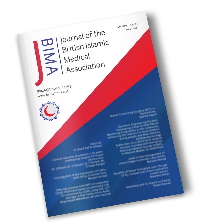
Nasreen Akhtar
Registered General Nurse & member of BIMA Cancer Screening Campaign
Abstract of poster which was presented at the BIMA National Conference , Birmingham 7th December 2019
Background
Cancer screening uptake within ethnic minorities has been well documented to be lower than the national average. This is further emphasised when we look at screening uptake within British Muslim communities. Health inequalities within this group stem from cultural and religious beliefs marred with language barriers and pockets of social and financial deprivation . A combination of these factors tend to hinder British Muslims from accessing cancer screening services that are available to them. Islamic faith is seen as a Centrepoint in the lives of many British Muslims therefore utilizing mosques and community faith based centres was deemed suitable to convey our cancer screening campaigns.
Method
Educational content which formed part of a presentation highlighting the 3 national cancer screening services, namely; breast, bowel and cervical cancer was provided by Cancer Research UK (CRUK) . This was reviewed by members of the Cancer Screening Core Review Team to make sure it is tailored to deal with cultural sensitivities.
The Muslim Council of Britain (MCB) helped us facilitate 39 faith based venues up and down the country to deliver the talks. Furthermore 5 local radio stations were also involved in delivering cancer screening awareness talks via their airwaves. A team of 900 BIMA members participated in the delivery of the talks throughout the months of February and March 2019.
Results
The cancer screening talks where a success as 900 individuals attended the events. A total of 166 feedback forms where received in valuable data. Nearly 50% of this number identified their ethnic origins as that of a British South Asian. 26% where unaware of the 3 national cancer screening programmes and 37% had previously missed their invitation to cancer screening. Overall the majority of the feedback received was positive as over 90% said that they would attend screening as well as encouraging others, in comparison to 38% and 53% before attending the talks.
Conclusion
Faith based health promotion has proved successful in this instance as it has triggered positive health awareness behaviours. Moving forward more research is needed to allow conventional health screening campaigns to be delivered in culturally adapted formats within faith institutions. In doing so health inequalities that exist due to language, cultural and religious beliefs can be reduced paving the way for equality in not only cancer screening but all other health related categories.

